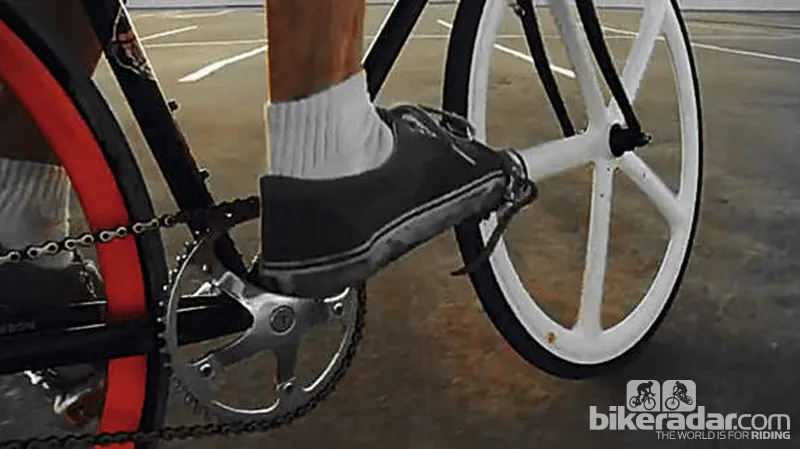Three or four years ago, London was full of fixed gear bikes. But, according to bike shop owners around the UK capital, that particular wave has broken and rolled back.
The London Fixed Gear and Single Speed Forum said they had the most ever users at one time back in August 2011. So have tastes changed and has function prevailed over form for all but the most dedicated commuters and bicycle couriers?
Bicycle gears do seem to be back, and in a in a big way. A couple of weeks ago, Tom Hipwell, co-owner of Fitzrovia Bicycles in the West End of London, told BikeRadar that road bike customisation was a line of work that was working well for the shop.
“I think people realise after a while that, if you want to do any decent riding, you’re going to need some gears,” he said, showing us the retro race frames and shiny titanium Van Nicholas bikes that adorn the shop.
Nigel Brook, a director at Brixton Cycles, a workers’ co-operative that see themselves as a destination for higher-end steel randonneurs, was more direct: “That wave [fixed gear] crashed against the beach about two years ago. Touring bikes are where it’s at now.”
He’s even coined a term for a number of the high-end tourers that leave the shop: redundancy bikes: “Everybody gets their fat redundancy cheque and they think, 'Sod this, I’m off to China' and they buy a [Surly] Long Haul Trucker and off they go.” Business in those bikes, its lighter-duty brother the Cross-Check, and the Genesis Equilibrium is brisk, he reported.
Brook said he thought some fixed gear aficionados will be glad the trend is thinning out. “I know of a few commuters who stopped riding fixed because it became so insufferably fashionable,” he explained. “They went back to their training road bike with mudguards.”

Both Hipwell and Brook agree that a hangover from fixie fever has remained – people are still after the bespoke twists and design niceties the trend introduced. “That retro look and feel is still very much there – it’s just been supplanted onto more suitable bikes,” explained Brook, who often has customers upgrading stock bar tape and saddles for something a little more chic, such as a Brooks saddle and bar tape.
Max Lewis, founder of Tokyo Fixed in Soho, said some hardcore fixed gear riders had become “devout roadies” and were even partial to wearing lycra if the occasion required it.
“The guys who are not messengers and come from creative backgrounds and are into fixed gears – a lot of them have become devout roadies. They’re training for the fixed gear criteriums – stuff like The Hunt and Red Hook Crit, and they’re training on road bikes and then vice versa. If they haven’t already bought their first road bike, they’re looking at it.”
The dilution effect
And yet, six weeks ago, Halfords announced that they would start selling fixies and estimated that the market was about 10,000 bikes a year.
Paul Duncan, who established Pauls Custom Cycles nearly two years ago, agreed that there’s still a market out there for fixies. “The death of fixed bikes? Really? I’m still selling them,” he told BikeRadar with a laugh. “The underground market, the original courier boys, are still there and that has not faded.”
He added, though, that geared bikes were dominating the market from his viewpoint, explaining that the market is in catering for London’s growing ranks of commuters. “For every one road bike that leaves this shop, 10 hybrids follow,” he said.
That, in reality, probably goes a long way to explaining why fixies are no longer so prevalent – they’ve been diluted by the sheer volume of geared bikes on London roads.
Seb Cherchi-Bersch, who set up London courier company Bycaboy.com in 2007, said the number of cyclists has ballooned. With their arrival there’s been a much greater variety of hardware on the road.
“There are still a hell of a lot of fixed gear and singlespeeds about, but there is a lot of everything out there,” Cherchi-Bersch said. “It’s all changed in the past five years or so, but the subculture that used to be associated with track bikes and fixed culture is certainly dispersed.
“I have noticed that, now that these bikes are starting to break or need maintenance or have been stolen, people’s second choice is maybe, 'I can sell my fixed and get a 29er or a cross-breed bike or a racer' – something more specific to their needs.”
So while bike shops are reporting maturation in the market, with people growing up and opting for gears, the legions of new bikes (Transport for London figures report an average 10 percent increase in annual bike journeys for the last three years) could well be exacerbating the impression that London is no longer fixated with the fixie.